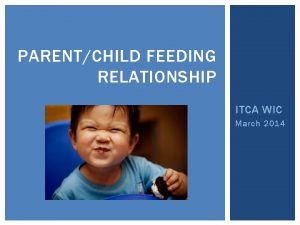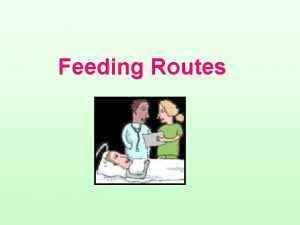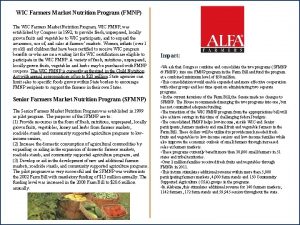PARENTCHILD FEEDING RELATIONSHIP ITCA WIC March 2014 SUMMARY


























- Slides: 26

PARENT/CHILD FEEDING RELATIONSHIP ITCA WIC March 2014

SUMMARY OBJECTIVES Learn how to help our families solve common meal-time conflicts and make meal and snack times with their kids fun and healthy. Topics that will be covered: • Roles for the caregiver and child • Appropriate vs inappropriate foods for kids • How to handle/provide NE for common scenarios • Counseling strategies for caregivers of overweight/underweight children • Sample handouts and tips to utilize them • Sample goals/ways to meet goals

OUR GOALS SHOULD BE TO RAISE A CHILD WHO… § Likes eating and feels good about it § Is interested in food § Likes being at the table § Relies on internal hunger cues and fullness to know how much to eat

GOALS, CONT. Enjoys many different foods Can try new foods and learn to like them Can turn down foods politely Can make do with less than favorite foods

WHAT ARE SOME COMMON CONFLICTS? I’m not hungry/I don’t want to eat. I’m hungry now. I don’t like that. I want [cereal] please. See what a good eater I am? I want to do it myself.

WHO’S IN CHARGE? Are kids under 5 old enough to plan a menu? Or go grocery shopping?

DIVISION OF RESPONSIBILITY WHO DECIDES WHAT? Caregiver decides: § What is served (what to eat) § When it is served (when to eat) § Where food is served (where to eat) Children decide: § If they will eat. § How much they will eat.

CAREGIVER ROLES DETAILS CAREGIVERS ARE RESPONSIBLE FOR: Controlling what food comes into the house Making and presenting meals Insisting that children show up for meals Making meals pleasant

CAREGIVER ROLES CONT. CAREGIVERS ARE RESPONSIBLE FOR: Teaching children to behave at the table Regulating timing and content of snacks Making other rules (no standing at the refrigerator door, no candy before dinner, etc. ) Other rules?

CAREGIVERS ARE NOT RESPONSIBLE FOR… How much the child eats Whether the child eats How the child’s body turns out § Scenario: Sally is worried about how much soda her overweight son is drinking. What actions are appropriate for her to take?

HOW MUCH SHOULD KIDS EAT? Guidelines are available, but we don’t really know Children’s brains/bodies tell them how much they should eat Eating needs vary from child to child and from day to day § What about children who are overweight or underweight? Any difference in responsibilities?

APPROPRIATE FOODS Nutrient content Texture Variety Low/No added sugar/salt Portion size

COMMON ISSUES Cautious about foods Asks for something else Only likes one or two foods Never seems hungry Only wants junk food/drinks

NUTRITION EDUCATION Cautious about foods 1. Offer a familiar food along with 1 or 2 new foods 2. New foods in small amounts 3. Offer a choice between two new foods 4. Encourage child to at least try it 5. Mix it in with something familiar

NUTRITION EDUCATION Asks for something else 1. Offer two choices of what is available or has been served. 2. Let her help make/serve the meal. 3. Serve the food and let her decide if she will eat or not. 4. Offer a small amount of the preferred food if it is available.

NUTRITION EDUCATION Never seems hungry 1. How much milk/juice/other drinks are they having, and when? 2. What is their feeding schedule like – set times vs grazing? 3. Have him sit at the table with the others. 4. Offer meals/snacks every 2 -3 hours.

NUTRITION EDUCATION Only likes 1 or 2 foods 1. If it is a healthy food, may offer it often-once a day or a small amt more often. 2. If it is unhealthy, do not buy it/bring it in the house. 3. Offer other foods along with the favorite.

NUTRITION EDUCATION Only wants junk food 1. Avoid purchasing. 2. Avoid letting kids see you eat them. 3. Be a good role model – eat with your child. Let them see you eat healthy.

NUTRITION EDUCATION Eats only small amounts 1. How much milk/juice/other drinks are they having, and when? 2. What is their feeding schedule like – set times vs grazing? 3. Do the parents know what an appropriate portion size is? 4. Do not make a big deal about whether the child eats or not. Just offer a variety of healthy foods at set times.

SAMPLE HANDOUTS Picky Eaters § Is your child a picky eater? § Juice Healthy Snack Options § Make snack time fun and healthy § The F/V guide to good TASTE for kids! Other § Fit WIC Newsletters

SAMPLE GOALS Problem: Child just wants to drink milk and juice and is never hungry. Goal: Limit juice and milk. Ways to meet: 1. Starting tomorrow, only offer milk and juice with meals and one snack. 2. Offer water at with other snacks and between meals.

SAMPLE GOALS Problem: Child doesn’t like to try new foods. Goal: Encourage new foods. Ways to meet: 1. Offer one new food at meal times along with foods the child does like. 2. Start at dinner today and do this for every meal.

SAMPLE GOALS Problem: Child doesn’t eat so caregiver gives whatever the child wants so she’ll eat something. Goal: Encourage healthier eating. Ways to meet: 1. Serve the same foods to the entire family. 2. Let your child serve herself out of the foods that are offered. OR Offer a choice of 2 items. 3. Serve the food and don’t make a big deal about it if she eats it or not. 4. Try this for at least 2 weeks starting this week.

SAMPLE GOALS Problem: Child only wants junk food. Goal: Encourage healthier eating. Ways to meet: 1. Starting this week, at meal times serve the types of foods you want your child to eat. 2. For one snack out of the day, serve a small portion of the junk food your child likes along with some healthier snack options. 3. Do not buy junk foods when you go

SAMPLE GOALS Problem: Child doesn’t like any vegetables. Goal: Encourage vegetables. Ways to meet: 1. Ask the child to pick out vegetables on your grocery list when you’re shopping. 2. Let your child help prepare the vegetables they picked out. 3. As a snack/art project make fun faces out of small pieces of vegetables with your child once a week.

SAMPLE GOALS Problem: Child only picks at his food and doesn’t eat a whole meal. Goal: Offer regular meals/snacks. Ways to meet: 1. Offer 3 meals and 2 -3 snacks a day so he has a chance to eat every 2 -3 hours. 2. Do not offer foods or drinks except water between those times. 3. It’s ok if your child does not want to eat, he has his next meal or snack in 2 -3 hours.
 Itca wic
Itca wic Itca wic
Itca wic Specialized nutritional support
Specialized nutritional support Portafolio estudiantil itca
Portafolio estudiantil itca Poland national anthem lyrics
Poland national anthem lyrics Simple ecosystem
Simple ecosystem Environment and feeding relationship
Environment and feeding relationship Weekly current events quiz
Weekly current events quiz Relationship management vs relationship marketing
Relationship management vs relationship marketing History of wic
History of wic Wic approved bread
Wic approved bread Vena wic
Vena wic Georgia wic formula
Georgia wic formula Wic juice
Wic juice Pars state wic
Pars state wic Oregon wic program
Oregon wic program Wic oatmeal
Wic oatmeal Wic juice
Wic juice Georgia wic
Georgia wic Ids nutrition
Ids nutrition Fruits and vegetables jeopardy
Fruits and vegetables jeopardy Wic yogurt
Wic yogurt Wic in cold chain
Wic in cold chain Wic yogurt
Wic yogurt Yogurt whole milk wic
Yogurt whole milk wic Tnwic
Tnwic Wic similac total comfort
Wic similac total comfort
















































